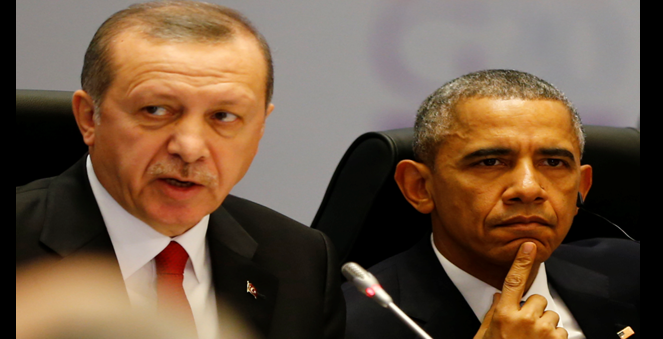Turkey Increasingly Isolated On Syria Operations

NEW DELHI: Turkey hit out at the United States over the latter’s criticism of Ankara’s ongoing operations in Syria.
Following comments by a US military spokesman who had expressed hopes that rather than see Turkey pursue Kurdish fighters, "all parties involved are going to stop shooting at each other and focus" on IS, Ankara contacted the US ambassador over comments the foreign ministry called "unacceptable".
The criticism comes as Turkish forces have been targeting Islamic State fighters across the border in Syria, but have also been bombarding Kurdish strongholds in the same region. The assault on the Kurds has drawn criticism from several quarters, with the United States leading the fray. Although the US and Turkey are allies in the region, the US depends heavily on Kurdish militias in its operation against IS in Syria and Iraq.
On Wednesday, Russia too stepped up criticism of Ankara’s role in the conflict, with the foreign affairs ministry calling on Turkey to avoid strikes in Syria on opposition and ethnic groups fighting Islamic State, including Syrian Kurds.
Turkey's EU Affairs Minister Omer Celik reacted harshly, saying that "Turkey is a sovereign state, it is a legitimate state… To suggest it is on a par with a terrorist organisation and suggest there are talks between them, that a deal has been reached between them, this is unacceptable."
Turkey, on its part, maintains that Kurdish groups are terror outfits, and has unsparingly gone after their strongholds as it has dramatically escalated its role in the conflict in Syria in the last few weeks. Turkey’s military campaign in Syria saw a renewed push following a suicide attack on Gaziantep that killed 54 people.
Following the attack on Gaziantep, Turkish forces and allied factions of the rebel Free Syrian Army (FSA) forced Islamic State forces out of the Syrian border city of Jarablus a week ago and have since pounded neighbouring villages held by Kurdish-led, US-backed Syria Democratic Forces (SDF). The Kurdish Popular Protection Units (YPG), which forms a key part of the SDF, has said that its forces have withdrawn and has accused Ankara for using its action against the group as a “pretext” to occupying Syria. Over the weekend, the US Defence Secretary Ash Carter called on Turkey to stay focused on the fight against IS and not to engage the SDF.
Turkey, however, has reiterated that it will continue with the operation till the very end. Prime Minister Binali Yildirim said on Wednesday that "operations will continue until all terrorist elements have been neutralised, until all threats to our borders, our lands and our citizens are completely over".
President Recep Tayyip Erdogan made a similar commitment a few days ago, saying “We can not tolerate any terror organisation within or close to our borders… That's why we are in [Syria's] Jarablus. And, if necessary, we will not flinch from taking on similar responsibilities in other areas." The Turkish President told a supportive crowd that "operations against terrorist organisations will continue until the end.” We will make any kind of contribution to the work to clear Daesh from Syria," Erdogan said, adding that “for the issue of the PYD (Democratic Union Party) terror group in Syria, we have just the same determination.”
Meanwhile, civilians are the worst affected. According to the UK based Syrian Observatory for Human Rights, at least 40 civilians were killed in separate Turkish strikes near the village of al-Amarneh and in Jeb al-Kussa, which are just outside Jarablus. The group added that at least four Kurdish fighters had been killed and 15 wounded in the bombardments.
Turkey, on its part, denied the civilian toll, saying its operation had killed 25 “terrorists.” State-run Anadolu news agency reported that in a statement issued by the Turkish armed forces, the air campaign was carried out against "terrorist groups" which had attacked Turkish soldiers supporting a Free Syrian Army (FSA) operation in Jarablus.
Turkey’s predicament is evinced by the fact that its fighting both the Islamic State and Kurdish militias, who in turn, are at war with each other. In fact, Turkey’s main ally in the war, the United States, outrightly supports Kurdish forces in the fight against IS in Syria and parts of Iraq.
This is because Turkey views the YPG as an extension of the Kurdistan Workers Party (PKK), and has stepped up its offensive against the Kurdish militias after a two year ceasefire between Turkey and the PKK broke down last summer, following a bombing that killed 32 young Kurdish and left-wing activists in the south-eastern city of Suruc in July.
Ankara in turn suspects the Islamic State’s involvement in the attack, as those targeted were traveling across the border to help rebuild the battered city of Kobane. The PKK accused Turkey of wanting IS fighters to succeed in an attempt to put a stop to Kurdish territorial gains in Syria and Iraq, and responded with a wave of counter attacks that continue today.



